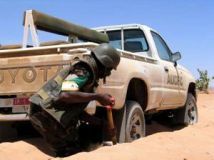US to move quickly to aid African Union in Darfur
By Carol Giacomo, Diplomatic Correspondent
WASHINGTON, April 29 (Reuters) – The United States is prepared to make a quick commitment of $50 million to $60 million to support an expanded African Union peacemaking mission in an effort to halt the violence in Sudan’s troubled Darfur region, U.S. officials say.

|
|
A soldier from the African Union Force digs out a truck stuck in a pool of sand during a routine patrol to a village on the outskirts of the northern Darfur town of El-Fasher on April 17, 2005. (Reuters) . |
Under political attack for not doing enough to end a crisis it has described as genocide, the Bush administration is pursuing a multinational strategy that U.S. officials believe could yield results in the next couple of months.
The African Union, with strong U.S. encouragement, on Thursday decided to expand its military and police force in Darfur from 3,320 to 7,731 troops by September. The AU also asked NATO for logistical support.
While any NATO role could take time to work out because of alliance politics, the United States expects to quickly provide new aid so the AU can nearly double its 16 base camps in Darfur as it prepares to put new troops on the ground as early as June, a senior State Department official told Reuters.
Now that the AU had made its decision on Thursday, he said the United States hoped “very shortly to announce concrete support … We’re talking maybe $50 to $60 million.”
The U.S. portion would be about one-third of the price tag for the expanded AU mission, with the rest coming from the European Union, Japan and Canada.
Although some critics say Washington is trying to absolve itself of Darfur by transferring responsibility to the AU, officials insist AU forces have made a real difference in the limited locations where they operate.
The AU force is deployed in areas where hundreds of thousands of people have fled their villages to escape death and atrocities at the hands of government-backed Janjaweed Arab militias.
The AU has orders to monitor a shaky cease-fire signed a year ago, with only limited powers to protect civilians. But the AU decision to strengthen its mandate could remedy that.
U.S. Deputy Secretary of State Robert Zoellick has taken on Sudan as part of his portfolio and is said to be working on the issue daily. He traveled to Darfur two weeks ago and said then he believed the AU is helping hold down the violence.
The State Department’s Sudan expert, Mike Ranneberger, last week did a more thorough assessment, visiting six AU camps and discussing the AU’s role with tribal leaders, humanitarian workers and rebel field commanders.
An official said Ranneberger came away even more impressed with the AU’s “very activist approach…They are aggressively getting out into the field and patrolling humanitarian roads.”
In several instances, AU forces have pre-empted violence by occupying villages ahead of an imminent attack, he said.
But the forces need more vehicles and reliable communications to become truly effective, officials said.
On his trip, Zoellick warned that if the violence isn’t ended, Sudan risks losing an even bigger pot of U.S. assistance — $1.7 billion pledged at a donor’s conference in Oslo.
Khartoum no longer supports the Arab militias with helicopter gunships and its troops no longer accompany the Janjaweed in battle, a U.S. official said.
But there has been “no specific reduction in violence” since Zoellick’s visit and there are “numerous indicators” the Sudan government is still in very close contact with the Janjaweed and continues to support the militias with equipment and probably actual cash payments, the official said.
The administration doubts Khartoum’s claims that the Janjaweed is now out of its control and is pressing for proof that all assistance has ended, U.S. officials said.
Tens of thousands have died in the Darfur revolt, launched more than two years ago. Rebels accuse the central government of neglect and of giving preferential treatment to Arab tribes over non-Arabs.
